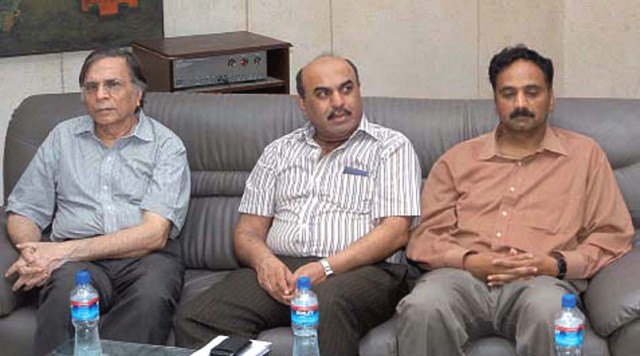
The ceremony was organised by Strengthening Participatory Organization (SPO), an NGO. The books’ title read: Tarikh Kay Naey Zawiey (New Aspects of History) and Tarikh Ki Agahi (Understanding History).
Speaking on the occasion, Ghafir Shehzad, a writer, said that Dr Mubarik’s writings on history were not limited to dates and personalities. He said that Dr Mubarik’s work was perfect for introducing lay people to their history.
“He has brought history from the corridors of power to the common people,” Shehzad said.
Salman Abid, the SPO regional head, said that through his work Dr Mubqarik has tried to highlight the importance of history and how one should learn from it to improve the future.
Quoting from an essay titled Street Power versus State Power from Tarikh Kay Naey Zawiey, Abid said that Dr Mubarik had conducted an in-depth analysis of the ways in which states consolidate themselves by suppressing street power. He mentioned that Dr Mubarik had also covered the phenomenon of political Islam and its centrality to our present crises.
Abid also talked about the second book, Tarikh Ki Agahi. He said that the book discussed why societies needed heroes. “The book analyses how hero worship has deliberately been promoted in our society to captivate the common men,” he said.
He mentioned another of Dr Mubarik’s essays, Suicide Attacks and Suicides, and said, “It highlights the need to see the political aspect of suicide attacks and not just the religious aspect.”
Aslam Gurdaspuri praised Dr Mubarik’s works for not being limited to palaces and courts. He said that the historian employed a scientific method to document history and emphasised common man’s issues.
He said, “One of the remarkable qualities of his works is that they link history to contemporary issues which makes it more relevant to the reader.”
In his concluding address, Dr Mubarik said that history’s importance derived from its ability to make us aware of change.
“We should always be ready for change. A lot of problems get solved If our mind is prepared in advance to deal with the changing times,” he said. He said that for most people history revolved around certain personalities. This, he said, was not a useful approach because it hampered objective analysis.
He added that no ideology was universal as everything kept changing with the passage of time.
“Often it is said that great personalities make history, this is not true, it is the common people who define history.
In our country too history has not been written from the common people’s perspective and it is very difficult to work on it as no research has ever been done on it,” he said.
Dr Mubarik said that the revenue and the court records were available and should be effectively used to rewrite history as a history of the common people and not that of the elite.
Highlighting the contrast between the perspectives we take on history, he said, “The Taj Mahal was built by common people and not by Emperor Shah Jahan, but today we only associate him with the grandeur of the structure.”
Published in The Express Tribune, July 9th, 2010.




1732538123-0/BeFunky-collage-(90)1732538123-0-165x106.webp)

1732530440-5/Copy-of-Untitled-(85)1732530440-5-270x192.webp)



1732534225-0/Express-Tribune-(13)1732534225-0-270x192.webp)






COMMENTS
Comments are moderated and generally will be posted if they are on-topic and not abusive.
For more information, please see our Comments FAQ